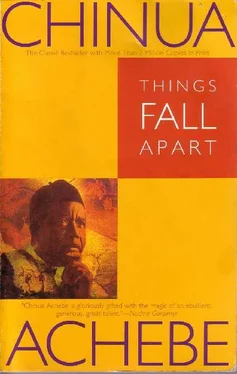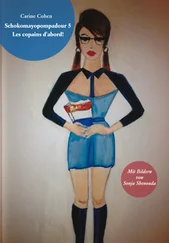Chinua Achebe - Things Fall Apart
Здесь есть возможность читать онлайн «Chinua Achebe - Things Fall Apart» весь текст электронной книги совершенно бесплатно (целиком полную версию без сокращений). В некоторых случаях можно слушать аудио, скачать через торрент в формате fb2 и присутствует краткое содержание. Город: New York, Год выпуска: 1994, Издательство: A DIVISION OF RANDOM HOUSE, INC., Жанр: Контркультура, на английском языке. Описание произведения, (предисловие) а так же отзывы посетителей доступны на портале библиотеки ЛибКат.
- Название:Things Fall Apart
- Автор:
- Издательство:A DIVISION OF RANDOM HOUSE, INC.
- Жанр:
- Год:1994
- Город:New York
- ISBN:нет данных
- Рейтинг книги:2 / 5. Голосов: 2
-
Избранное:Добавить в избранное
- Отзывы:
-
Ваша оценка:
- 40
- 1
- 2
- 3
- 4
- 5
Things Fall Apart: краткое содержание, описание и аннотация
Предлагаем к чтению аннотацию, описание, краткое содержание или предисловие (зависит от того, что написал сам автор книги «Things Fall Apart»). Если вы не нашли необходимую информацию о книге — напишите в комментариях, мы постараемся отыскать её.
—W. B. Yeats, "The Second Coming"
Things Fall Apart — читать онлайн бесплатно полную книгу (весь текст) целиком
Ниже представлен текст книги, разбитый по страницам. Система сохранения места последней прочитанной страницы, позволяет с удобством читать онлайн бесплатно книгу «Things Fall Apart», без необходимости каждый раз заново искать на чём Вы остановились. Поставьте закладку, и сможете в любой момент перейти на страницу, на которой закончили чтение.
Интервал:
Закладка:
Eze elina, elina!
Sala
Eze ilikwa ya Ikwaba akwa olьjholi Ebe Danda nechi eze Ebe Uzuzu nete ecfwu
Sala
He sang it in his mind, and walked to its beat. If the song ended on his right foot, his mother was alive. If it ended on his left, she was dead. No, not dead, but ill. It ended on the right. She was alive and well. He sang the song again, and it ended on the left. But the second time did not count. The first voice gets to Chukwu, or God's house. That was a favorite saying of children. Ikemefuna felt like a child once more. It must be the thought of going home to his mother.
One of the men behind him cleared his throat. Ikemefuna looked back, and the man growled at him to go on and not stand looking back. The way he said it sent cold fear down Ikemefuna's back. His hands trembled vaguely on the black pot he carried. Why had Okonkwo withdrawn to the rear? Ikemefuna felt his legs melting under him. And he was afraid to look back.
As the man who had cleared his throat drew up and raised his machete, Okonkwo looked away. He heard the blow. The pot fell and broke in the sand. He heard Ikemefuna cry, "My father, they have killed me!" as he ran towards him. Dazed with fear, Okonkwo drew his machete and cut him down. He was afraid of being thought weak.
As soon as his father walked in, that night, Nwoye knew that Ikemefuna had been killed, and something seemed to give way inside him, like the snapping of a tightened bow. He did not cry. He just hung limp. He had had the same kind of feeling not long ago, during the last harvest season. Every child loved the harvest season. Those who were big enough to carry even a few yams in a tiny basket went with grown-ups to the farm. And if they could not help in digging up the yams, they could gather firewood together for roasting the ones that would be eaten there on the farm. This roasted yam soaked in red palm-oil and eaten in the open farm was sweeter than any meal at home. It was after such a day at the farm during the last harvest that Nwoye had felt for the first time a snapping inside him like the one he now felt. They were returning home with baskets of yams from a distant farm across the stream when they heard the voice of an infant crying in the thick forest. A sudden hush had fallen on the women, who had been talking, and they had quickened their steps. Nwoye had heard that twins were put in earthenware pots and thrown
Acbcfce a't'tay in the forest, but he had never yet come across them. A v^gue chill had descended on him and his head had seemed to s"Vell, like a solitary walker at night who passes an evil spirit °n the way. Then something had given way inside him. It descended on him again, this feeling, when his father walked ir't't that night after killing Ikemefuna.
CHAPTER EIGHT
Okonkwo did not taste any food for two days after the death of Ikemefuna. He drank palm-wine from morning till night, and his eyes were red and fierce like the eyes of a rat when it was caught by the tail and dashed against the floor. He called his son, Nwoye, to sit with him in his obi . But the boy was afraid of him and slipped out of the hut as soon as he noticed him dozing.
He did not sleep at night. He tried not to think about Ikemefuna,-but the more he tried the more he thought about him. Once he got up from bed and walked about his compound. But he was so weak that his legs could hardly carry him. He felt like a drunken giant walking with the limbs of a mosquito. Now and then a cold shiver descended on his head and spread down his body.
On the third day he asked his second wife, Ekwefi, to roast plantains for him. She prepared it the way he liked—with slices of oil-bean and fish.
"You have not eaten for two days," said his daughter Ezinma when she brought the food to him. "So you must finish this." She sat down and stretched her legs in front of her. Okonkwo ate the food absent-mindedly. 'She should have been a boy,' he thought as he looked at his ten-year-old daughter. He passed her a piece of fish.
"Go and bring me some cold water," he said. Ezinma rushed out of the hut, chewing the fish, and soon returned with a bowl of cool water from the earthen pot in her mother's hut.
Okonkwo took the bowl from her and gulped the water down. He ate a few more pieces of plaintain and pushed the dish aside.
"Bring me my bag," he asked, and Ezinma brought his goatskin bag from the far end of the hut. He searched in it for his snuff-bottle. It was a deep bag and took almost the whole length of his arm. It contained other things apart from his snuff-bottle. There was a drinking horn in it, and also a drinking gourd, and they knocked against each other as he searched. When he brought out the snuff-bottle he tapped it a few times against his knee-cap before taking out some snuff on the palm of his left hand. Then he remembered that he had not taken out his snuff-spoon. He searched his bag again and brought out a small, flat, ivory spoon, with which he carried the brown snuff to his nostrils.
Ezinma took the dish in one hand and the empty water bowl in the other and went back to her mother's hut. "She should have been a boy," Okonkwo said to himself again. His mind went back to Ikemefuna and he shivered. If only he could find some work to do he would be able to forget. But it was the season of rest between the harvest and the next planting season. The only work that men did at this time was covering the walls of their compound with new palm fronds. And Okonkwo had already done that. He had finished it on the very day the locusts came, when he had worked on one side of the wall and Ikemefuna and Nwoye on the other.
"When did you become a shivering old woman," Okonkwo asked himself, "you, who are known in all the nine villages for your valor in war? How can a man who has killed five men in battle fall to pieces because he has added a boy to their number? Okonkwo, you have become a woman indeed."
He sprang to his feet, hung his goatskin bag on his shoulder and went to visit his friend, Obierika.
Obierika was sitting outside under the shade of an orange tree making thatches from leaves of the raffia-palm. He exchanged greetings with Okonkwo and led the way into his obi .
"I was coming over to see you as soon as I finished that thatch," he said, rubbing off the grains of sand that clung to his thighs.
"Is it well?" Okonkwo asked.
"Yes," replied Obierika. "My daughter's suitor is coming today and I hope we will clinch the matter of the bride-price. I want you to be there."
Just then Obierika's son, Maduka, came into the obi from outside, greeted Okonkwo and turned towards the compound,
"Come and shake hands with me," Okonkwo said to the lad. "Your wrestling the other day gave me much happiness." The boy smiled, shook hands with Okonkwo and went into the compound.
"He will do great things," Okonkwo said. "If I had a son like him I should be happy. I am worried about Nwoye. A bowl of pounded yams can throw him in a wrestling match. His two younger brothers are more promising. But I can tell you, Obierika, that my children do not resemble me. Where are the young suckers that will grow when the old banana tree dies? If Ezinma had been a boy I would have been happier. She has the right spirit."
"You worry yourself for nothing," said Obierika. "The children are still very young."
"Nwoye is old enough to impregnate a woman. At his age I was already fending for myself. No, my friend, he is not too young. A chick that will grow into a cock can be spotted the very day it hatches. I have done my best to make Nwoye grow into a man, but there is too much of his mother in him."
"Too much of his grandfather," Obierika thought, but he did not say it. The same thought also came to Okonkwo's mind. But he had long learned how to lay that ghost. Whenever the thought of his father's weakness and failure troubled him he expelled it by thinking about his own strength and success. And so he did now. His mind went to his latest show of manliness.
Читать дальшеИнтервал:
Закладка:
Похожие книги на «Things Fall Apart»
Представляем Вашему вниманию похожие книги на «Things Fall Apart» списком для выбора. Мы отобрали схожую по названию и смыслу литературу в надежде предоставить читателям больше вариантов отыскать новые, интересные, ещё непрочитанные произведения.
Обсуждение, отзывы о книге «Things Fall Apart» и просто собственные мнения читателей. Оставьте ваши комментарии, напишите, что Вы думаете о произведении, его смысле или главных героях. Укажите что конкретно понравилось, а что нет, и почему Вы так считаете.












